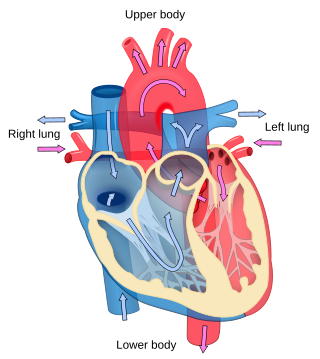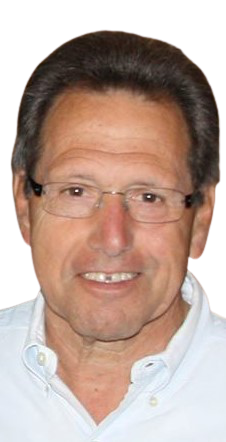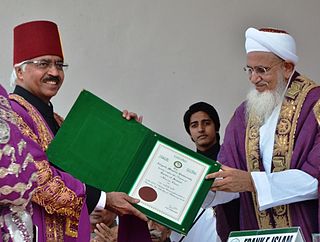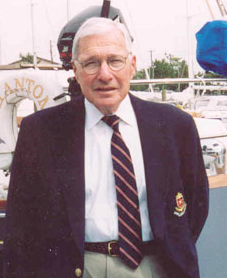
Cardiology is the study of the heart. Cardiology is a branch of medicine that deals with disorders of the heart and the cardiovascular system. The field includes medical diagnosis and treatment of congenital heart defects, coronary artery disease, heart failure, valvular heart disease, and electrophysiology. Physicians who specialize in this field of medicine are called cardiologists, a sub-specialty of internal medicine. Pediatric cardiologists are pediatricians who specialize in cardiology. Physicians who specialize in cardiac surgery are called cardiothoracic surgeons or cardiac surgeons, a specialty of general surgery.

A cardiac stress test is a cardiological examination that evaluates the cardiovascular system's response to external stress within a controlled clinical setting. This stress response can be induced through physical exercise or intravenous pharmacological stimulation of heart rate.

The American College of Cardiology (ACC), based in Washington, D.C., is a nonprofit medical association established in 1949. It bestows credentials upon cardiovascular specialists who meet its qualifications. Education is a core component of the college, which is also active in the formulation of health policy and the support of cardiovascular research.
Paul N. Yu was an American cardiologist, physician-scientist and educator of Chinese descent, and a product of Chinese, British and American medical education. Over a career spanning several decades he trained numerous individuals in clinical cardiology who went on to leadership positions in academia throughout this country.

Melvyn Rubenfire is a cardiologist in the University of Michigan Health System, as well as a professor in the department of internal medicine. He is also director of the preventive cardiology department.

Mark E. Josephson (1943-2017) was an American cardiologist and writer, who was in the 1970s one of the American pioneers of the medical cardiology subspecialty of cardiac electrophysiology. His book titled Clinical Cardiac Electrophysiology: Techniques and Interpretations is widely acknowledged as the definitive treatment of the discipline. He served as Herman Dana Professor of Medicine at Harvard Medical School, director of the Harvard-Thorndike Electrophysiology Institute and Arrhythmia Service and the chief of cardiology at Harvard University's Beth Israel Deaconess Medical Center in Boston.

William Clifford Roberts was an American physician specializing in cardiac pathology.
Professor Peter Sleight M.D.(Cantab.), D.M. (Oxon.) FRCP FACC was a distinguished and internationally renowned research cardiologist and an Honorary Consultant Physician at the John Radcliffe Hospital in Oxford and the Oxford University Hospitals NHS Foundation Trust. Sleight was Emeritus Field Marshal Alexander Professor of Cardiovascular Medicine at the University of Oxford and an Emeritus Fellow of Exeter College, Oxford.

Ashok Seth is an Indian interventional cardiologist, credited with the performance of over 50,000 angiograms and 20,000 angioplasties, which has been included in the Limca Book of Records, a book for achievements and records from an Indian perspective. He is a Fellow of the Royal Colleges of Physicians of London, Edinburgh and Ireland and serves as the chief cardiologist, holding the chairs of the department of cardiovascular sciences and cardiology council at the Fortis Healthcare. Seth, a recipient of the Order of Isabella the Catholic, was honored by the Government of India with the fourth highest Indian civilian award of Padma Shri, in 2003, followed by Padma Bhushan, the third highest Indian civilian award, in 2015.

Edmund Hiram Sonnenblick was an American medical researcher and cardiologist. His studies of the function of cardiac muscle cells during the 1960s shaped the basis of both cardiovascular physiology and the modern treatment of cardiovascular disease, making possible the development of ACE inhibitors. In 1962, he was credited as the first person to image the heart muscle under scientifically-controlled conditions using the electron microscope. Though Sonnenblick's ideas about the relationship between the structure and function of the human heart today constitute medical-scientific commonsense, they were utterly novel at the time.
Kim Allan Williams Sr. is an American cardiologist. He is a Fellow of the American College of Cardiology and served as its president from 2015 to 2016. He is currently a trustee of the organization.
Gerald Sanders Berenson was an American cardiologist, heart researcher, and public health specialist who specialized in researching the causes of heart diseases. Berenson's fundamental research revealed that adult heart disease arises from practices and behaviors that begin in childhood. He also discovered that atherosclerosis was significantly more pronounced in individuals who had three or four cardiovascular risk factors compared to those who had none.
Bruce B. Lerman is a cardiologist. He is the Hilda Altschul Master Professor of Medicine at Weill Cornell Medical College, and was chief of the Division of Cardiology and director of the Cardiac Electrophysiology Laboratory at Weill Cornell Medicine and the New York Presbyterian Hospital.

Wael Fahed Al-Husami is a Jordanian cardiologist and interventional cardiologist, scientist and medical educator at Tufts University and a faculty member at Brown University’s Alpert Medical School, and a faculty Member at BIDMC Disaster Medicine Fellowship - Harvard Medical School. Wael Al-Husami is also a visiting professor of Medicine at the Royal College of Surgeons in Ireland.
Partho P. Sengupta is an Indian-American cardiologist. He is the Henry Rutgers Professor of Cardiology and Chief of the Division of Cardiovascular Disease & Hypertension at the Robert Wood Johnson Medical School (RWJMS) and the Chief of Cardiology, Robert Wood Johnson University Hospital (RWJUH) since July 1, 2021. Between 2019 and 2021, Dr. Sengupta was the Abnash C. Jain Chair & Professor of Cardiology at West Virginia University School of Medicine and the Chief of Division of Cardiology, Chair of Cardiovascular Innovation and Director of Cardiac Imaging at West Virginia University Heart and Vascular Institute.
Michelle Asha Albert is an American physician who is the Walter A. Haas Lucie-Stern Endowed Chair in Cardiology and professor of medicine at the University of California, San Francisco. Albert is director of the UCSF Center for the Study of Adversity and Cardiovascular Disease. She is president of the American Heart Association. She served as the president of the Association of Black Cardiologists in 2020–2022 and as president of the Association of University Cardiologists (2021–2022). Albert is an elected member of the National Academy of Medicine, the American Society of Clinical Investigators and the Association of American Physicians.

Jason C. Kovacic is an Australian-born cardiologist and physician-scientist; the Robert Graham Chair and Professor of Medicine, University of New South Wales; Executive Director of the Victor Chang Cardiac Research Institute in Sydney, Australia; and Professor of Medicine (Cardiology) at the Icahn School of Medicine at Mount Sinai, New York.
Harvey Feigenbaum is an American cardiologist known for his life-long work in the field of echocardiography. He wrote the first textbook on the subject in 1972, which is currently in its 8th edition, and has published over 300 articles. He has trained generations of cardiologists including many of the world's pioneers in the field through his numerous visitors, frequent workshops, annual courses in Indianapolis, Indiana beginning in 1968, the year when he started formal fellowship training He founded the field of cardiac sonography in 1965 and the American Society of Echocardiography in 1975. His seminal article on the diagnosis of pericardial effusions published in 1965 with his technique "brought echocardiography to the attention of thousands of practitioners".
Sanjay Rajagopalan is the Herman Hellerstein Professor of Medicine and Chief Scientific and Medical Officer at the Harrington Heart and Vascular Institute, University Hospitals and Professor Medicine at Case Western Reserve University (CWRU) in Cleveland, Ohio. He holds secondary appointments in the Case Western Reserve University Departments of Physiology, Radiology and Biomedical Engineering. Much of his research has been on using technology to guide the detection and treatment of heart disease and more recently on the impact of environmental exposures and climate change on cardiovascular health.
Lionel Henry Opie was a South African cardiologist. He was a professor of medicine at the University of Cape Town, where he conducted both experimental and clinical research on heart disease and cardiovascular physiology, metabolism, and pharmacology. He was the founding director of the university's Hatter Institute for Cardiovascular Research and the founding editor of the Journal of Molecular and Cellular Cardiology. He also served as president of the International Society for Heart Research.









